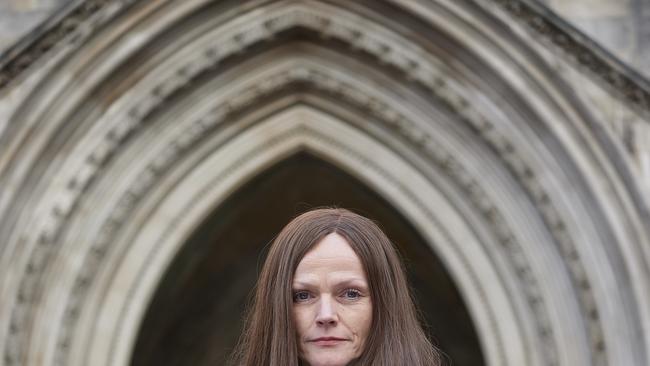Hillsborough tragedy revisited: Anne tells tragic football story
The BBC dramatises one mother’s crusade for the truth in a mass accident at Hillsborough football stadium in 1989.

I can still remember the press coverage here in Australia in 1989 when 97 supporters were killed in a terrible crowd crush at the FA Cup semi-final between Liverpool and Nottingham Forest at Sheffield Wednesday’s Hillsborough football stadium. I vividly recall a later panning shot of Liverpool’s Anfield ground covered in bunches of flowers, hats and pennants to help commemorate the tragedy.
It was April 15, and those who died – the 97th victim, Andrew Devine, passed only last year after suffering life-changing injuries in the crush – were trapped against a high metal fence at the front of the Leppings Lane terrace, which had been allocated to Liverpool supporters. It was “the kind built at many grounds to prevent people invading the pitch, in an era when hooliganism by a minority of thugs led to the demonisation of all football supporters”, according to journalist David Conn, who has reported on the disaster for many years.
Behind the fence, railings divided the terrace into a series of what were known as “pens”, little more “than iron cages”, allowing the police to control supporters. When they were overcrowded it allowed no escape. The tragic crush occurred when police, inexperienced at crowd control and hoping to ease the massive congestion outside, opened an exit gate allowing thousands of fans to race into the pens.
The TV footage was dreadful — images hard to forget — and there seemed little reason at the time to not believe the police and the London press who claimed the Liverpool fans had been drunk and disorderly. One tabloid even suggested fans had beaten up on police as they tried to help, picked the pockets of victims and even urinated on the brave South Yorkshire coppers.
Like so many, I had no idea that it would take 32 years for the truth to emerge and be accepted – that the main cause of the disaster was police incompetence and inexperience. And that local parliamentarians, senior police, and the media in fact all collaborated to protect their own interests.
As the new series, Anne, dramatises so compellingly through the crusade for truth by one mother — a Liverpool housewife called Anne Williams, played with both intensity and great empathy by Maxine Peake — it was from the beginning a grievous miscarriage of justice. As Conn suggested in his 1997 book The Football Business, the families of those so killed were abandoned by the justice system to a terrible fight that prevented them from rebuilding their lives.
The coroner originally recorded a verdict of accidental death. It was Anne’s lifelong cause to overturn it when it became clear that she and all the other mothers had been lied to by the police about what really happened on that day. “I need to know what my boy died of at a game of football,” she cries out during the first episode, not prepared to accept official findings of the “when and where” of his death. “What about the why and how,” she says in a fury.
Anne is produced by award-winning program makers, World Productions, famous these days for the huge hit Line of Duty and more recently the very good Vigil, the submarine thriller that was also a twisty police procedural. But they also developed the true-crime three-parter The Pembrokeshire Murders based on the real-life investigation into the murders of Peter and Gwenda Dixon, the couple robbed and shot dead while walking on a coastal path in Pembrokeshire in 1989. Still available on the estimable streamer Britbox, The Pembrokeshire Murders is one of those sensitive true crime dramas that never loses sight of the victims in its dramatisation of a piece of painstaking detective work.
Anne is produced by Julia Stannard (Vanity Fair, War & Peace, Great Train Robbery), executive produced by Simon Heath, who runs World Productions, and who not only produced Line Of Duty but the BAFTA, Golden Globe and Emmy nominated political thriller Bodyguard.
It was written by Kevin Sampson, author of Hillsborough Voices, which depicts the tragic events of the day, and what unfolded in the days and years after the disaster. An accomplished novelist, he has a long history with Hillsborough. There as a fan to witness the horror first-hand, he also helped organise the Hillsborough benefit concert at Anfield and retains close connections with the justice campaign. The series was originally entitled “Mum”. And Samson says, “If there is one enduring message about this drama it is about that universal power of mothers who do whatever is necessary to do right by their children.”
The four-parter is directed by the veteran Bruce Goodison, who has been involved with both dramas and documentaries for decades. In 2011, he received a Bafta for Our War, the compelling BBC documentary about UK soldiers on the frontline, and he’s had other Bafta nods and even an Emmy nomination for The Flight That Fought Back.
The riveting drama was shot in and around Liverpool and Sheffield, even at Anfield itself, towards the end of 2018 but the initial broadcast, aimed for the 30th anniversary of the tragedy in April 2019, was delayed because of court hearings; ostensibly there was a media ban in place. “It was very sad to feel the families were forbidden from speaking about Hillsborough for a two-year period,” says Stannard. “The world was forbidden from speaking about it. Now we want as many people as possible to see this drama.”
During the several years the production was developed, Samson and the producers spoke in great detail not only with Anne’s daughter Sara, who co-operated with the scripting, but many others intimately connected to the tragedy to assist in developing the wider Hillsborough story. “We wanted to reassure them that we were going to tell the story in the right way and not try to speak for them,” Heath says. He points out that others may in time wish to tell their own stories but Anne is deliberately “one mother’s journey through grief as she fights for the truth of how her son died”.
The story, which effortlessly spans 24 years, opens in Anne’s small house in Formby Merseyside as Kevin (Campbell Wallace) and his mate leave for the football. Anne asks what time to expect him back. “Nineish, it’s only down the road, Sheffield,” he says happily. “Three nil to the Reds.”
Then, it’s 3pm and we cut to actual footage of the game starting. Sara (Lily Shepherd), Anne’s daughter, is still gardening in the small yard and as the sense of foreboding starts to envelop the narrative, she looks up and calls to her mother, “It’s gone cold again.”
The family watch the game but then a commentator says urgently, “Something has gone wrong at the end of the ground.” There’s footage of chaos emerging. “God, Steve, that looks bad,” Anne says to her husband Steve (Stephen Walters). By 5.30 the next morning the anxious parents are heading for Sheffield in search of Kevin, the news full of the catastrophe.
A kind of clearing centre has been established at the Medical-Legal Centre, the place surrounded by shouting journalists. “Got a name for us?” one yells insistently as they enter, people crying in grief. In a scene almost too unbearable to watch they are taken to a room by a policeman to look at some Polaroid photographs pinned to a board. The officer asks if one of them is their son Kevin. Anne’s voice breaks and says, “No, no he isn’t there, Kevin isn’t one of them,” refusing to believe that her son is dead. Instead, it is Steve who quietly mutters: “That’s our Kevin. Kevin is on the board.”
Quickly, the blame game starts in earnest and it becomes evident to Anne and Steve that they have little support from the police and the emergency services and the bereaved feel betrayed by official verdicts of accidental death. This is just the start of Anne’s battle for the truth of her son’s death, heartbroken, grief stricken and vengeful, which will take her until her death in 2013.
It’s a superb, respectful production carrying great emotional power, directed with lovely intimacy by Goodison, making great use of handheld cameras, possibly using various rigs to eliminate that often denigrated “camera shake”. There is also fine observant work from cinematographer Adam Gillham. There’s a pronounced psychological effect created, an intense subjectivity that suggests we are almost inside the relationship between Anne and her husband. The performances are intensely naturalistic.
And right from the start you sense the wider story. “When did the system ever protect us; they’ll always do this, Annie,” Steve says. “And there’s no point in trying to fight these people, because you can’t beat them.” As Heath says: “While we have yet to have public inquiries into the handling of Covid, people may be less accepting of what we’ve all had dealt to us. I think that’s what happened with Hillsborough.”
Anne, BBC First, Foxtel, Sunday, 8.30pm.




To join the conversation, please log in. Don't have an account? Register
Join the conversation, you are commenting as Logout